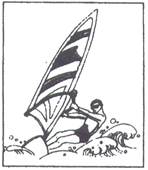题目内容
To be able to motivate oneself, or self-motivate, occurs when a person has the willingness to do something and is internally(内在地) motivated to do it.
Sometimes it’s very difficult to get ourselves moving. The natural tendency is to postpone. Life just seems to get in the way! There is a job to go to, groceries to do, television to watch—whoops! I guess we get pretty good at finding excuses to escape getting started on goals like an exercise routine or reading a new book. The fact is that we are creatures of routine and habit. So what can we do to motivate ourselves to accomplish our goals?
Here are some tips on how to get moving:
l Decide what you want. It’s hard to motivate an aimless mind. Set a goal and decide how you are going to go about it. Then break it down into smaller sections so it’s easier to handle and less overwhelming.(势不可挡)
l Keep track of your progress. Keep a log or journal where you can measure how much you have accomplished. Looking at it can also motivate you to keep pushing ahead.
l Post motivating pictures or slogans within your sight. It is always inspiring to see pictures of people who have accomplished what you’re going for. It makes it attainable and realistic. Likewise, little slogans like “go for it” or “just do it” can give you the little support you need.
l Sometimes we forget what we set out to do and a little reminder is all we need to be revitalized (激活) and focus on the end result. If you remind yourself to go for the desired promotion, it will re-establish why you are doing what you’re doing.
l Make it a habit. Once you have accomplished your objective, e.g. becoming an early riser, keep it up so that it’s second nature to you and you don’t have to think about it anymore.
64. According to the author, some people fail to achieve their goals because ________.
A. they don’t have enough desire
B. their life is filled with routine work
C. they benefit from the force of habit
D. they naturally put off forming new habits
65. It can be inferred from the underlined sentence that ________.
A. self-motivation needs repeated self-reminding of one’s goal
B. in modern society people tend to become forgetful
C. when we forget our goal, our life becomes meaningless
D. we can achieve our goal only by focusing on the end result
66. To get moving on your goal, you can do the following EXCEPT ________.
A. keep a diary to clearly judge your distance to your goal
B. make self-improvement your second nature
C. forget your aim and revitalize yourself with slogans
D. support yourself by hanging inspiring pictures in your house
67. Which of the following is the best title for the passage?
A. Set Goals in Your Life B. Get Yourself Motivated
C. Get into Good Habits D. Do Not Postpone
Sometimes it’s very difficult to get ourselves moving. The natural tendency is to postpone. Life just seems to get in the way! There is a job to go to, groceries to do, television to watch—whoops! I guess we get pretty good at finding excuses to escape getting started on goals like an exercise routine or reading a new book. The fact is that we are creatures of routine and habit. So what can we do to motivate ourselves to accomplish our goals?
Here are some tips on how to get moving:
l Decide what you want. It’s hard to motivate an aimless mind. Set a goal and decide how you are going to go about it. Then break it down into smaller sections so it’s easier to handle and less overwhelming.(势不可挡)
l Keep track of your progress. Keep a log or journal where you can measure how much you have accomplished. Looking at it can also motivate you to keep pushing ahead.
l Post motivating pictures or slogans within your sight. It is always inspiring to see pictures of people who have accomplished what you’re going for. It makes it attainable and realistic. Likewise, little slogans like “go for it” or “just do it” can give you the little support you need.
l Sometimes we forget what we set out to do and a little reminder is all we need to be revitalized (激活) and focus on the end result. If you remind yourself to go for the desired promotion, it will re-establish why you are doing what you’re doing.
l Make it a habit. Once you have accomplished your objective, e.g. becoming an early riser, keep it up so that it’s second nature to you and you don’t have to think about it anymore.
64. According to the author, some people fail to achieve their goals because ________.
A. they don’t have enough desire
B. their life is filled with routine work
C. they benefit from the force of habit
D. they naturally put off forming new habits
65. It can be inferred from the underlined sentence that ________.
A. self-motivation needs repeated self-reminding of one’s goal
B. in modern society people tend to become forgetful
C. when we forget our goal, our life becomes meaningless
D. we can achieve our goal only by focusing on the end result
66. To get moving on your goal, you can do the following EXCEPT ________.
A. keep a diary to clearly judge your distance to your goal
B. make self-improvement your second nature
C. forget your aim and revitalize yourself with slogans
D. support yourself by hanging inspiring pictures in your house
67. Which of the following is the best title for the passage?
A. Set Goals in Your Life B. Get Yourself Motivated
C. Get into Good Habits D. Do Not Postpone
64-67 DA CB
略

练习册系列答案
 口算小状元口算速算天天练系列答案
口算小状元口算速算天天练系列答案
相关题目
